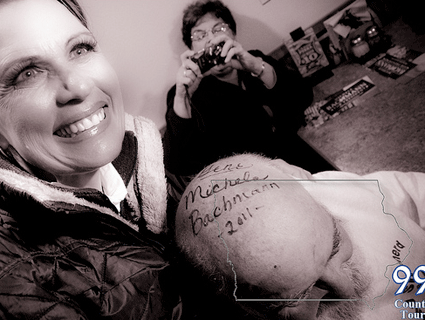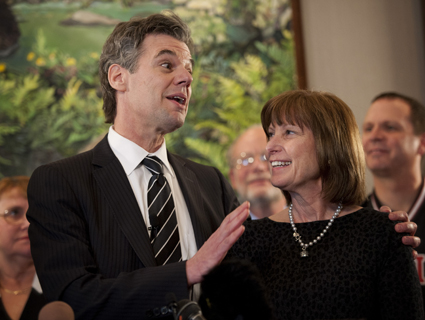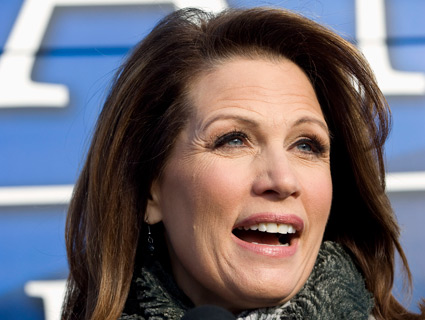
Minnesota congressional candidate Allen Quist<a href="http://www.flickr.com/photos/allenquist/6872866946/sizes/z/in/photostream/">Quist for Congress</a>/Flickr
Update, 8/14/12, 11:40 p.m.: With 72 percent of the precincts reporting, the Associated Press has called the First District GOP primary for Allen Quist.
Rep. Tim Walz should be in big trouble this November. The Minnesota Democrat’s district gave just 51 percent of its vote to Barack Obama in 2008 and the National Republican Congressional Committee is spending big bucks attacking Walz as an out-of-touch lefty.
But Walz has two things going for him. The GOP’s April nominating convention ended in a stalemate after 23 ballots, meaning the two top candidates have to spend the next three months preparing for the August primary. That, in turn, means Walz stands a decent chance of facing Allen Quist, a 67-year-old soybean farmer and onetime anti-sodomy crusader who believes that humans and dinosaurs may have coexisted in Southeast Asia as late as the 11th century.
Quist’s platform and ideology bears a close resemblance to another Minnesota conservative with a huge family and a love-hate relationship with modern science—Rep. Michele Bachmann. That’s no coincidence. Beginning in the late 1990s, the duo worked together to take down Minnesota’s state curriculum standards, which they considered a gateway to a totalitarian society built on moral relativism. He helped make her rise possible; now he wants to join her in Washington.
As a Minnesota state representative in the 1980s, Quist staked out a position on his party’s far-right wing. At the time, the state’s GOP was undergoing a rightward shift from a party known for its mild-mannered moderates to one populated by family values firebrands. Quist was the tip of the spear.
During his time as a state representative, Quist slammed a gay counseling clinic at Mankato State University by comparing it to the Ku Klux Klan (both would be breeding grounds for evil—AIDS, in this case) and went undercover at an adult bookstore and a gay bathhouse in an effort to prove to a local newspaper reporter that they had become a “haven for anal intercourse.” (A decade later, Bachmann would bring groups of supporters onto the Capitol floor to pray over the desk of a gay colleague.)
Quist’s almost singular focus on sexuality didn’t go unnoticed. “At one point,” the St. Petersburg Times reported in 1994, “a Senate leader suggested he had an unhealthy preoccupation with sex, having devoted 30 hours to it in a single session.”
Quist was a staunch pro-lifer who once argued that abortion should be classified as a first-degree homicide. When his pregnant wife died in a car accident in 1986, Quist had the six-and-a-half-month-old fetus placed in his wife’s arms in an open casket at the funeral. A year later, he married Julie Morse, a former pro-choice feminist who had been reborn as a Republican activist. (Morse had cofounded Minneapolis’ first feminist bookstore, Amazon Books; originally based on the front porch of a women’s collective, it soon migrated to the city’s Lesbian Community Center.)
In 1993, after returning to his corn and soybeans farm outside the small town of Norseland, Quist bucked his party by challenging the incumbent Republican governor, Arne Carlson, for the gubernatorial nomination. Quist stayed true to his roots. He called for mandatory AIDS testing as a prerequisite for obtaining a marriage license. And more than a decade before it emerged as a national issue, he campaigned against the advent of same-sex marriage in the Minnesota, running ads in which a priest marries two men, “Mike” and “Steve,” and pronounces them “man and man.”
In one memorable interview, Quist told a Minnesota* reporter he believed women were “genetically predisposed” to be subservient to men, pointing to, among other things, the behavior of wild animals.
Quist’s candidacy quickly became a national story—one that sent the state’s moderate party establishment scrambling to avert disaster. Mike Triggs, a former Carlson aide, told the Minneapolis Star-Tribune, “Mr. and Mrs. Gopher are going to think [the Quists] are damn weird.” He dismissed Quist supporters as “zombies.” The governor himself played up his opponent’s under-the-covers ops. “Instead of prowling through dirty bookstores, why didn’t he go out and change state spending policy?” the governor asked the Associated Press.
Carlson, who went on to beat Quist by 20 points, is still sore. “Wonderful, wonderful guy—one of the great intellectuals of the 21st century,” he deadpanned when asked about Quist recently. “He’ll do a lot to improve the IQ of Congress. If we can get a Bachmann-Quist team together, they could probably take over the world. Talk about a dynamic duo!”
But Quist’s campaign, as Carlson readily acknowledges, came at a turning point in Minnesota politics. He was increasingly finding himself in conflict with his own party; social conservative activists were ascendant.
Then, in the late 1990s, Quist passed the torch. A longtime opponent of any centralized educational system, Quist was energized by the implementation of the Profile of Learning, an attempt to bring the state into compliance with federal curriculum standards. He and Julie formed a nonprofit, the Maple River Education Coalition (MREC), to push for the Profile’s repeal. In Bachmann, they found a charismatic spokeswoman for the movement.
With Quist providing much of the intellectual grist, the MREC argued that the Profile was a step toward a United Nations takeover of Minnesota. International Baccalaureate, the global Advanced Placement program, was brainwashing by another name. “Sustainability” was a euphemism for a future dystopia in which humans would be confined to public-transit-oriented urban cores. Schools would be breeding grounds for “homosexual indoctrination.” Even math was under assault by the forces of moral relativism.
In 2000, Bachmann won election to the state Senate with help from the MREC and the Quists. When Bachmann ascended to Congress six years later, Julie Quist joined her, serving as the congresswoman’s district director until 2011.
Now, Bachmann seems eager to return the favor. In April, she sent out a letter to her vast fundraising network asking followers to support Quist’s bid. “The reason our organization did so much good was largely because of Allen’s intellectual firepower and courage,” Bachmann wrote, referring to her anti-Profile roots. “Many thousands of Minnesota students owe a huge debt of gratitude to Allen for his highly successful work with EdWatch.” (MREC had since rebranded itself EdWatch in an effort to reach a national audience.) In her book, Core of Conviction, she praises Quist for blowing the whistle on the federal government’s plan for “central planning.”
Quist went into semiretirement after the Profile was repealed, but he’s remained active in education circles, producing an online curriculum supplement for K-12 educators, designed to provide “accurate and exciting new information for teachers and other interested persons.”
One section asks this leading question: “Did dinosaurs and people live at the same time, and why do so many recently discovered ancient art works accurately picture dinosaurs?” The answer is a resounding “yes.” “The only reasonable explanation for the stegosaurus carved in stone on the wall of the Cambodian temple is that the artist had either seen a stegosaur or had seen other art works of a stegosaur,” Quist writes. “Either way, people and stegosaurs were living at the same time.”
Elsewhere, Quist provides scientific evidence for the existence of dragons, and suggests that the Book of Job be taught as a science lesson: “Today we know beyond a reasonable doubt—Job 41 is a picture-perfect description of SuperCroc.”
Quist, who did not respond to multiple requests for an interview, has his work cut out for him if he wants to bring the gospel to Capitol Hill. Although he came within a handful of votes of reaching the 60 percent threshold at the district convention, much of his support came from supporters of Rep. Ron Paul (R-Texas), who are less likely to turn out for a primary with no ramifications for the presidential race.
His past may also become an issue. Quist’s top opponent, Republican state Sen. Mike Parry, sought to defuse Quist’s momentum—he holds a slight fundraising lead—by circulating a flier at the district convention noting, among other things, that Quist had called for mandatory AIDS testing to “prevent major penetration of the AIDS virus into the straight population.” (Parry is no stranger to controversy: In 2009, he got in trouble for calling President Obama a “Power Hungry Arrogant Black Man” on Twitter—a comment he later scrubbed.) Quist’s GOP critics call him a “dinosaur.”
“Quist has not won an election in over 25 years,” says Ben Golnik, an adviser to the Parry campaign. “Parry overperformed the Republican gubernatorial candidate in 2010; he’s clearly electable.”
If Quist does make it through the primary, though, at least one Minnesota Republican will be supporting the moderate Democrat Walz: Carlson. “When he ran, obviously we looked him up—a very bizarre record. I mean really bizarre,” Carlson says, recalling the ’94 race.
“Unfortunately,” Carlson added, “what was bizarre in the ’90s is becoming the centerpiece of this new Republican party.”
*Correction: This article originally identified Quist’s quote as coming in an interview with a British reporter. It first appeared in the Twin Cities Reader.












